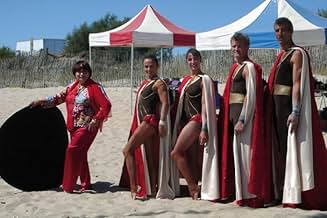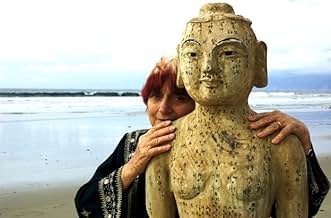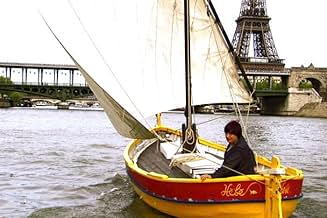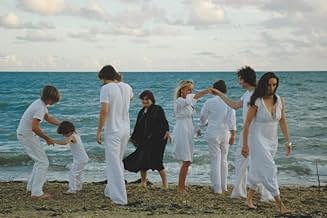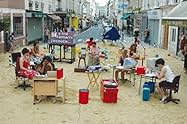IMDb-BEWERTUNG
8,0/10
5069
IHRE BEWERTUNG
Agnès Varda begibt sich auf eine überwiegend chronologische Entdeckungsreise durch ihre Erinnerungen - anhand von Fotos, Filmausschnitten, Interviews, Reinszenierungen sowie amüsanten, spiel... Alles lesenAgnès Varda begibt sich auf eine überwiegend chronologische Entdeckungsreise durch ihre Erinnerungen - anhand von Fotos, Filmausschnitten, Interviews, Reinszenierungen sowie amüsanten, spielerischen gegenwärtigen Szenen, wie sie ihre Geschichte erzählt.Agnès Varda begibt sich auf eine überwiegend chronologische Entdeckungsreise durch ihre Erinnerungen - anhand von Fotos, Filmausschnitten, Interviews, Reinszenierungen sowie amüsanten, spielerischen gegenwärtigen Szenen, wie sie ihre Geschichte erzählt.
- Regie
- Drehbuch
- Hauptbesetzung
- Auszeichnungen
- 12 Gewinne & 13 Nominierungen insgesamt
Gerald Ayres
- Self
- (as Gerry Ayres)
Patricia Louisianna Knop
- Self
- (as Patricia Knop)
Empfohlene Bewertungen
In a revealing and playful mood, filmmaker Agnes Varda narrates her own filmed autobiography in The Beaches of Agnes. The film begins with Varda, now 82, setting up mirrors on the beach with the sounds of one of her mother's favorite works, Schubert's Unfinished Symphony in the background Though she asserts that "Today, I'm playing a little old lady, talkative and plump," she looks anything like a little old lady. The film re-creates her life with childhood memories that take her back to homes she knew as a child in Brussels and the city of Sete where she made her first film at the age of 26.
The film is not a dry documentary, filled with reminiscences of people we never heard of. It is a work of art in itself, a celebration not only of her life, but of all life. Along the way, Varda takes us to Los Angeles (one of her favorite cities in which she lived) where she talks about and shows photos of her former husband Jacques Demy, who she announces died of AIDS in 1990, Jane Birkin, Chris Marker (dressed as a cartoon cat) and even poet, singer Jim Morrison. Varda began as a photographer and we see an example of her photos from a long time ago. While the film documents Varda's films beginning with her first Le Pointe Curé in 1956 to the present day and the first appearances on film of Gerald Depardieu, Phillipe Noiret, and Harrison Ford, she also discusses in detail and shows excerpts from her most popular films including Cléo from 5 to 7, Le Bonheur, Vagabond, The Gleaners and I, and her documentary tributes to her husband.
Rather than an egoists attempt to enhance a reputation with big events in which she participated, the film looks at small things like the uniform she had to wear in Vichy France and a scene at an outdoor flea market where the director finds cardboard cutouts of herself and other filmmakers with their works listed on the back. But there is much more. With actors dramatizing important memories from her life, The Beaches of Agnes is filled with the people, including her two grown children, places and events, including her trips to Cuba and China that contributed to her personal growth and made her the lively and vibrant person she is today. She closes the documentary by saying, "I am alive, and I remember." While we are still alive, we will remember her.
The film is not a dry documentary, filled with reminiscences of people we never heard of. It is a work of art in itself, a celebration not only of her life, but of all life. Along the way, Varda takes us to Los Angeles (one of her favorite cities in which she lived) where she talks about and shows photos of her former husband Jacques Demy, who she announces died of AIDS in 1990, Jane Birkin, Chris Marker (dressed as a cartoon cat) and even poet, singer Jim Morrison. Varda began as a photographer and we see an example of her photos from a long time ago. While the film documents Varda's films beginning with her first Le Pointe Curé in 1956 to the present day and the first appearances on film of Gerald Depardieu, Phillipe Noiret, and Harrison Ford, she also discusses in detail and shows excerpts from her most popular films including Cléo from 5 to 7, Le Bonheur, Vagabond, The Gleaners and I, and her documentary tributes to her husband.
Rather than an egoists attempt to enhance a reputation with big events in which she participated, the film looks at small things like the uniform she had to wear in Vichy France and a scene at an outdoor flea market where the director finds cardboard cutouts of herself and other filmmakers with their works listed on the back. But there is much more. With actors dramatizing important memories from her life, The Beaches of Agnes is filled with the people, including her two grown children, places and events, including her trips to Cuba and China that contributed to her personal growth and made her the lively and vibrant person she is today. She closes the documentary by saying, "I am alive, and I remember." While we are still alive, we will remember her.
Autobiographies can be the worst or the best of things. Either a boring exercise in conceit and self-absorption or a fascinating self-exploration by a person of value.
Well, the Agnes of 'Les plages d'Agnès' being Agnès Varda there is no need to worry. She undoubtedly belongs to the second category.
It goes without saying that to fully appreciate this wonderful film you have to be a minimum acquainted with Varda's oeuvre. But a minimum is enough, for it does not take long before the lady starts captivating you, not by boasting about all the masterpieces she made, but by creating a new kind of story-telling right before your eyes.
One thing I am pretty sure of is that there is no other film, autobiographical or not, that looks like "Les plages d'Agnès".
Of course there is no question that Varda's life is rich and worth telling: she worked for and with great artists, she was married to one of the most original French directors ever (Jacques Demy), she covered the fledgling Chinese and Cuban revolutions, fought in favor of feminism when it was not yet fashionable to do so. The real issue for the director was in fact to find HOW to talk about herself. Well after viewing "Les Plages d'Agnès", I can tell her (and I am far from being the only one to think so): "You did it brilliantly, Agnès".
Indeed Agnès Varda is not content to go through the motions of the standard autobiographical movie: talking face to the camera or in voice over, interviewing witnesses of her life and illustrating her words with significant clips. She does that of course but she knows how to enrich the material through a lot original finds: the mirrors on the beaches,her walking backwards to show she goes back in time, the circus artists on the beach, recreating her Cine Tamaris production office on a fake beach in Rue Daguerre, her sailing a boat from Sete to Paris as an allegory of the evolution of her career, etc. etc. Agnès Varda never rests on her laurels throughout. Quite the contrary: she creates, invents, tries out new things sequence after sequence. In the film she calls herself 'une petite vieille' (a short old lady) but I suspect she says so out of vanity because she does not look old at all. Actually, she has retained all the freshness, all the spontaneity of the young lady she once was.
Don't refrain from seeing this film even if it does not appeal to you in the first place. When the end credits roll you will probably - just like I did - utter with a sigh: "Is it already the end?"
Well, the Agnes of 'Les plages d'Agnès' being Agnès Varda there is no need to worry. She undoubtedly belongs to the second category.
It goes without saying that to fully appreciate this wonderful film you have to be a minimum acquainted with Varda's oeuvre. But a minimum is enough, for it does not take long before the lady starts captivating you, not by boasting about all the masterpieces she made, but by creating a new kind of story-telling right before your eyes.
One thing I am pretty sure of is that there is no other film, autobiographical or not, that looks like "Les plages d'Agnès".
Of course there is no question that Varda's life is rich and worth telling: she worked for and with great artists, she was married to one of the most original French directors ever (Jacques Demy), she covered the fledgling Chinese and Cuban revolutions, fought in favor of feminism when it was not yet fashionable to do so. The real issue for the director was in fact to find HOW to talk about herself. Well after viewing "Les Plages d'Agnès", I can tell her (and I am far from being the only one to think so): "You did it brilliantly, Agnès".
Indeed Agnès Varda is not content to go through the motions of the standard autobiographical movie: talking face to the camera or in voice over, interviewing witnesses of her life and illustrating her words with significant clips. She does that of course but she knows how to enrich the material through a lot original finds: the mirrors on the beaches,her walking backwards to show she goes back in time, the circus artists on the beach, recreating her Cine Tamaris production office on a fake beach in Rue Daguerre, her sailing a boat from Sete to Paris as an allegory of the evolution of her career, etc. etc. Agnès Varda never rests on her laurels throughout. Quite the contrary: she creates, invents, tries out new things sequence after sequence. In the film she calls herself 'une petite vieille' (a short old lady) but I suspect she says so out of vanity because she does not look old at all. Actually, she has retained all the freshness, all the spontaneity of the young lady she once was.
Don't refrain from seeing this film even if it does not appeal to you in the first place. When the end credits roll you will probably - just like I did - utter with a sigh: "Is it already the end?"
Agnès Varda presented us in this autobiographical movie with her memories of a life devoted to the cinema and not only. She does that in powerful and beautiful images supported by a brilliant, witty and sensitive commentary. In this movie we can see references to several of some of the best Varda's films such as La Pointe Courte, Cléo de 5 à 7 and Le Bonheur, with images, and to some of the greatest and more important figures of French cinema such as her husband Jacques Demy to begin with and also Godard, Catherine Deneuve, Michel Piccoli, Jane Birkin and others. The cut is very intelligent and effective in visual terms combining the present and the past sometimes in simultaneous images with a special effect here and there. A masterpiece indeed.
The French movie Les plages d'Agnès was shown in the U.S. with the title The Beaches of Agnès (2008). It was directed by Agnès Varda.
This is a summing up movie, completed by Varda when she was 80 years old. It's really a semi-documentary, but it includes surreal elements that Varda interweaves with commentary, historical movie clips, and direct discussions with the us, the audience.
If you're an Agnès Varda fan, this movie will be perfect. If you've never seen a Varda film, it may not make much sense. Even so, it's interesting, funny, and poignant. If you're not sure, take a chance on it.
We saw the movie at the excellent Dryden Theatre in the George Eastman Museum in Rochester, NY. It was part of an Agnès Varda retrospective, cosponsored by Rochester Institute of Technology and the Eastman Museum. It will work better on the large screen, but it will be satisfactory on the small screen as well.
This is a summing up movie, completed by Varda when she was 80 years old. It's really a semi-documentary, but it includes surreal elements that Varda interweaves with commentary, historical movie clips, and direct discussions with the us, the audience.
If you're an Agnès Varda fan, this movie will be perfect. If you've never seen a Varda film, it may not make much sense. Even so, it's interesting, funny, and poignant. If you're not sure, take a chance on it.
We saw the movie at the excellent Dryden Theatre in the George Eastman Museum in Rochester, NY. It was part of an Agnès Varda retrospective, cosponsored by Rochester Institute of Technology and the Eastman Museum. It will work better on the large screen, but it will be satisfactory on the small screen as well.
"The Beaches of Agnes" is an autobiographical documentary done in a uniquely impressionistic style. The subject is Agnes Varda, the legendary French director who began her career in the 1950s and, who at the age of 80, shows that she is still a master of her art and craft. For not only does Varda provide the voice-over narration for the film, but she conceived and directed the project as well.
Varda uses as her focal point the various beaches where she spent a great deal of her time growing up. It is to these places that she has brought a crew of filmmakers to shoot her delivering extended monologues on her life and to restage - often in a cleverly amusing and surrealistic style - memories and events that have remained with her throughout the years. When she has actual photos and file footage from the past, she is quick to use them, but when she doesn't, she turns to present-day re-creations to fill in the gaps. But all is not limited to the beach, for she frequently heads inland to retrace the steps of her life, visiting key locations along the way.
She explores her childhood, when she lived much of the time on a houseboat; her teen years, when she was thoroughly ignorant of what a woman could do in the world and of the realities of man/woman relationships; her experiences during the War and the Occupation, when most French citizens "lived day to day;" her years studying art at the Ecole du Louvre; her first taste of freedom and independence when she stole off one night all on her own to Corsica; her time spent as a fisherman; her burgeoning fascination with photography; her marriage to fellow director and film-making inspiration, Jacques Demy; her role as mother and grandmother; her trips to Cuba and Southern California in the 1960s to capture in photos and on film the turbulent nature of that period; her fervent pro-feminist leanings that often found their way into her movies; and her eventual transition to film-making herself to become the only female figurehead of the French New Wave, an otherwise Young Boys' Club that included, in addition to Demy, Godard, Truffaut, Resnais, and various other cinematic masters.
It is here that the movie turns to Varda's career as a filmmaker, as the artist herself discusses her inspirations, her key themes and concerns, and the logistical problems of the movie-making process itself. The movie provides us with a generous sampling of clips from not just her own movies but those of Demy as well.
As she reflects back on her life, Varda addresses the issues of aging, memory, and personal loss (especially of her beloved Jacques, who died of AIDS in 1990). She views the sea as representative of permanence - and human beings and their foreshortened life spans as symbols of the universe at its most temporal. Through its mixing of the real with the surreal, the literal with the figurative, "The Beaches of Agnes" mirrors the hybrid nature of Varda's photographic and cinematic works themselves.
But the movie is often at its most charming when it is content to simply BE, when some seemingly random image, person, event or thought comes along to capture Varda's complete and undivided attention - a testament to her astute powers of observation, to her complete and utter absorption in the moment, and to her ability to make art out of the raw materials of actual life.
And isn't that what movie-making is really all about, after all?
Varda uses as her focal point the various beaches where she spent a great deal of her time growing up. It is to these places that she has brought a crew of filmmakers to shoot her delivering extended monologues on her life and to restage - often in a cleverly amusing and surrealistic style - memories and events that have remained with her throughout the years. When she has actual photos and file footage from the past, she is quick to use them, but when she doesn't, she turns to present-day re-creations to fill in the gaps. But all is not limited to the beach, for she frequently heads inland to retrace the steps of her life, visiting key locations along the way.
She explores her childhood, when she lived much of the time on a houseboat; her teen years, when she was thoroughly ignorant of what a woman could do in the world and of the realities of man/woman relationships; her experiences during the War and the Occupation, when most French citizens "lived day to day;" her years studying art at the Ecole du Louvre; her first taste of freedom and independence when she stole off one night all on her own to Corsica; her time spent as a fisherman; her burgeoning fascination with photography; her marriage to fellow director and film-making inspiration, Jacques Demy; her role as mother and grandmother; her trips to Cuba and Southern California in the 1960s to capture in photos and on film the turbulent nature of that period; her fervent pro-feminist leanings that often found their way into her movies; and her eventual transition to film-making herself to become the only female figurehead of the French New Wave, an otherwise Young Boys' Club that included, in addition to Demy, Godard, Truffaut, Resnais, and various other cinematic masters.
It is here that the movie turns to Varda's career as a filmmaker, as the artist herself discusses her inspirations, her key themes and concerns, and the logistical problems of the movie-making process itself. The movie provides us with a generous sampling of clips from not just her own movies but those of Demy as well.
As she reflects back on her life, Varda addresses the issues of aging, memory, and personal loss (especially of her beloved Jacques, who died of AIDS in 1990). She views the sea as representative of permanence - and human beings and their foreshortened life spans as symbols of the universe at its most temporal. Through its mixing of the real with the surreal, the literal with the figurative, "The Beaches of Agnes" mirrors the hybrid nature of Varda's photographic and cinematic works themselves.
But the movie is often at its most charming when it is content to simply BE, when some seemingly random image, person, event or thought comes along to capture Varda's complete and undivided attention - a testament to her astute powers of observation, to her complete and utter absorption in the moment, and to her ability to make art out of the raw materials of actual life.
And isn't that what movie-making is really all about, after all?
Wusstest du schon
- WissenswertesFrench visa # 118156.
- VerbindungenEdited into Film socialisme (2010)
Top-Auswahl
Melde dich zum Bewerten an und greife auf die Watchlist für personalisierte Empfehlungen zu.
- How long is The Beaches of Agnès?Powered by Alexa
Details
- Erscheinungsdatum
- Herkunftsland
- Offizielle Standorte
- Sprachen
- Auch bekannt als
- Die Strände von Agnès
- Drehorte
- Produktionsfirmen
- Weitere beteiligte Unternehmen bei IMDbPro anzeigen
Box Office
- Budget
- 1.900.000 € (geschätzt)
- Bruttoertrag in den USA und Kanada
- 239.711 $
- Eröffnungswochenende in den USA und in Kanada
- 19.032 $
- 5. Juli 2009
- Weltweiter Bruttoertrag
- 2.235.006 $
- Laufzeit1 Stunde 52 Minuten
- Farbe
- Seitenverhältnis
- 1.85 : 1
Zu dieser Seite beitragen
Bearbeitung vorschlagen oder fehlenden Inhalt hinzufügen


![Bande-annonce [OV] ansehen](https://m.media-amazon.com/images/M/MV5BZGYxNzE1MDgtYjIzMy00NmY0LTkyMmItMTFkZjVlNmMyNTVmXkEyXkFqcGdeQXRyYW5zY29kZS13b3JrZmxvdw@@._V1_QL75_UX500_CR0)



